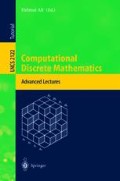Abstract
The 0/1-Borsuk problem asks whether every subset of {0, 1}d can be partitioned into at most d + 1 sets of smaller diameter. This is known to be false in high dimensions (in particular for d ≥ 561, due to Kahn & Kalai, Nilli, and Raigorodskii), and yields the known counter-examples to Borsuk’s problem posed in 1933.
Here we ask whether there might be counterexamples in low dimension as well. We show that there is no counterexample to the 0/1-Borsuk conjecture in dimensions d ≤ 9. (In contrast, the general Borsuk conjecture is open even for d = 4.)
Our study relates the 0/1-case of Borsuk’s problem to the coloring problem for the Hamming graphs, to the geometry of a Hamming code, as well as to some upper bounds for the sizes of binary codes.
Supported by a DFG Gerhard-Hess-Forschungsförderungspreis (Zi 475/2-3).
Access this chapter
Tax calculation will be finalised at checkout
Purchases are for personal use only
Preview
Unable to display preview. Download preview PDF.
References
M. Aigner & G. M. Ziegler: Proofs from THE BOOK, Springer-Verlag, Heidelberg Berlin 1998.
N. Alon: Personal communication, Oberwolfach 1999.
M. R. Best: Optimal codes, in: “Packing and Covering in Combinatorics” (A. Schrijver, ed.), Mathematical Centre Tracts 106 (1979), 119–140.
M. R. Best & A. E. Brouwer: The triply shortened binary Hamming code is optimal, Discrete Math. 17 (1977), 235–245.
V. Boltyanski, H. Martini & P. S. Soltan: Excursions into Combinatorial Geometry, Universitext, Springer-Verlag, Berlin Heidelberg 1997.
Borsuk: Drei Sätze über die n-dimensionale euklidische Sphäre, Fundamenta Math. 20 (1933), 177–190.
T. Dvořák, I. Havel, J.-M. Laborde & P. Liebl: Generalized hypercubes and graph embedding with dilation, Rostocker Math. Kolloq. 39 (1990), 13–20.
B. Grünbaum: Borsuk’s problem and related questions, in: “Convexity” (V. Klee, ed.), Proc. Symposia in Pure Mathematics, Vol. VII, Amer. Math. Soc., Providence RI 1963, pp. 271–284.
S. Hougardy: personal and email communications, 1999/2000.
T. R. Jensen & B. Toft: Graph Coloring Problems, Wiley, New York 1994.
J. Kahn & G. Kalai: A counterexample to Borsuk’s conjecture, Bulletin Amer. Math. Soc. 29 (1993), 60–62.
N. Linial, R. Meshulam & M. Tarsi: Matroidal bijections between graphs, J. Combinatorial Theory, Ser. B 45 (1988), 31–44.
Y. Litsyn & A. Vardy: The uniqueness of the Best code, IEEE Transactions Information Theory 40 (1994), 1693–1698.
F. J. MacWilliams & N. J. A. Sloane: The Theory of Errow-Correcting Codes, Parts I and II, North Holland, Amsterdam 1977.
J. P. McCammond & G. M. Ziegler: The 0/1-Borsuk conjecture is generically true for each fixed diameter, Preprint 2000, in preparation.
A. Nilli: On Borsuk’s problem, in: “Jerusalem Combinatorics’ 93” (H. Barcelo and G. Kalai, eds.), Contemporary Mathematics 178, Amer. Math. Soc. 1994, 209–210.
C. Payan: On the chromatic number of cube-like graphs, Discrete Math. 103 (1992), 271–277.
J. Petersen: Färbung von Borsuk-Graphen in niedriger Dimension, Diplomarbeit, TU Berlin 1998, 39 pages.
A. D. Petford & D. J. A. Welsh: A randomised 3-colouring algorithm, Discrete Math. 74 (1989), 253–261.
A. M. Raigorodskii: On the dimension in Borsuk’s problem, Russian Math. Surveys (6) 52 (1997), 1324–1325.
A. M. Raigorodskii: On a bound in Borsuk’s problem, Russian Math. Surveys (2) 54, 453–454.
F. Schiller: Zur Berechnung und Abschätzung von Färbungszahlen und der ϑ-Funk-tion von Graphen, Diplomarbeit, TU Berlin 1999, 50 pages.
A. Schrijver: personal communication, Barcelona 1997.
B. Weissbach: Sets with large Borsuk number, Preprint 1999; Beiträge Geometrie Algebra, to appear.
G. M. Ziegler: Lectures on 0/1-polytopes, in: “Polytopes — Combinatorics and Computation” (G. Kalai & G.M. Ziegler, eds.), DMV-Seminar 29, Birkhäuser Verlag Basel 2000, 1–44, in print.
Author information
Authors and Affiliations
Editor information
Editors and Affiliations
Rights and permissions
Copyright information
© 2001 Springer-Verlag Berlin Heidelberg
About this chapter
Cite this chapter
Ziegler, G.M. (2001). Coloring Hamming Graphs, Optimal Binary Codes, and the 0/1-Borsuk Problem in Low Dimensions. In: Alt, H. (eds) Computational Discrete Mathematics. Lecture Notes in Computer Science, vol 2122. Springer, Berlin, Heidelberg. https://doi.org/10.1007/3-540-45506-X_12
Download citation
DOI: https://doi.org/10.1007/3-540-45506-X_12
Published:
Publisher Name: Springer, Berlin, Heidelberg
Print ISBN: 978-3-540-42775-9
Online ISBN: 978-3-540-45506-6
eBook Packages: Springer Book Archive

